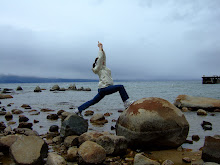
There have been long periods in my life when my conversations with God happened down on my knees or with folded hands, sometimes with a rosary, often in sanctuaries (at crazy hours of the night in order to have the whole space to myself). Pretty traditional. But I've learned, out of necessity in a variety of forms, to talk and listen to God in a variety of ways. It's kind of nice to know that some of the other ways I talk to God are every bit as traditional as some of our stereotypical images of prayer.
 Feinberg writes about the fact that "God whispers" (p. 96). That's why we have to listen more carefully and stay very close to God in order to hear these divine whispers that will lead us down right paths.
Feinberg writes about the fact that "God whispers" (p. 96). That's why we have to listen more carefully and stay very close to God in order to hear these divine whispers that will lead us down right paths.
Walking. Intentional, reflective silence. Meditating on candlelight or icons or other art. Listening to trees and smelling clouds. Resting--emptying my mind enough that God can speak to me in dreams. I now find God to be "surprisingly talkative" when I do these things and others. God doesn't speak to me in all of these ways in a single day, or at least I haven't yet gotten that good at listening. But I find that, at different points along my journey, God and I agree to meet in different places, different postures, different sights and sounds and even tastes.
 Feinberg writes about the fact that "God whispers" (p. 96). That's why we have to listen more carefully and stay very close to God in order to hear these divine whispers that will lead us down right paths.
Feinberg writes about the fact that "God whispers" (p. 96). That's why we have to listen more carefully and stay very close to God in order to hear these divine whispers that will lead us down right paths. Lately, especially now that it's warm again, I'm find God in nature. Perhaps it's obvious from the look of this blog, but I'm head-over-heels in love with the west and particularly with rocks. Wildflowers are a newer passion, but I love the way God shows off with bursts of color! Now that it's warm and sunny, I'm spending time with God in my garden, walking along the canals, and sitting on rocks in the middle of nowhere. Lately God is assuring me over and over that I'm in the right place, that I'm not on this journey alone but together with God. (I didn't know that I needed so much reassurance, but it sure feels good to get it!) I'm also getting God's message to me to rest, to find Sabbath, to not neglect the command to "be still and know" (Ps. 46:10). 

Where are you finding God these days? What is God saying to you these days?
What about Sabbath and rest? Watch this and think about it.











